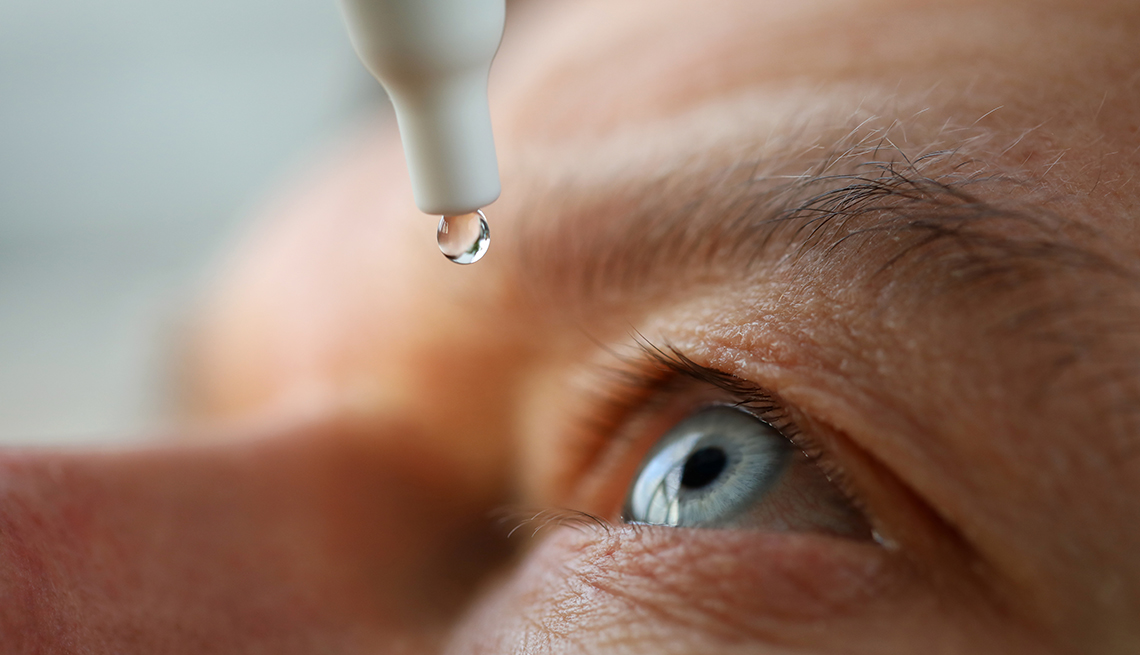Fda approves eye drops to improve near vision loss
Fda approves eye drops to improve near vision loss"
- Select a language for the TTS:
- UK English Female
- UK English Male
- US English Female
- US English Male
- Australian Female
- Australian Male
- Language selected: (auto detect) - EN
Play all audios:
Toni Wright, 54, a beauty industry professional from Pittsburgh, Pennsylvania, was forever squinting at her computer screen and cellphone. In restaurants, especially those with low lights,
she was the one holding the menu as far away as her arm could reach. Diagnosed with presbyopia — age-related blurred near vision — when she was 50, Wright says, “I needed to have reading
glasses with me at all times and almost panicked if I didn’t.” Presbyopia is estimated to affect 2 billion people globally, according to the American Academy of Ophthalmology (AAO). But
there is good news for all the squinters among us: In October, the U.S. Food and Drug Administration (FDA) approved the first (and so far, only) eye drops that treat presbyopia. The eye
drops, called Vuity, contain pilocarpine, which has been used for around 120 years to treat glaucoma. This is the first formulation to target presbyopia specifically. Allergan, a subsidiary
of AbbVie, rolled out Vuity on Dec. 9. Available by prescription only, Vuity works very simply. Itslightly reduces pupil size by constricting certain muscles, explains AbbVie advisory
board consultant Marguerite McDonald, M.D., a clinical professor of ophthalmology at both New York University and Tulane University. The constriction allows for improved up-close vision.
Approved for use once daily, it works for up to six hours. It costs about $86 for a 2.5 milliliter bottle (about a 30-day supply), depending on the pharmacy you visit. Wright, who
participated in the clinical trial for Vuity, would put the drops in her eyes in the morning, and she found that the effect kicked in by the time she got to work. McDonald says, on average,
it should start working within 15 minutes. “I could see on my computer without struggling or needing glasses, and it lasted throughout the workday,” Wright reports. She says she felt no
negative side effects. Vuity reports that users may experience temporary problems when changing focus between near and far objects. In its development of the drops, the company found that
participants achieved a “three-line gain or more reading a near-vision eye chart without losing more than one line in a distance vision eye chart at Day 30, three hours after dosing.”
Trending News
New hearing aids offer wireless links, health monitoringMemorial Day Sale! Join AARP for just $11 per year with a 5-year membership Join now and get a FREE gift. Expires 6/4 G...
High-resolution mapping of infraslow cortical brain activity enabled by graphene microtransistorsABSTRACT Recording infraslow brain signals (<0.1 Hz) with microelectrodes is severely hampered by current microelectr...
Coronavirus lockdown may not end on april 14 in up; here's why* Home * News * Coronavirus Lockdown May Not End on April 14 in UP; CM Announces COVID-Care Fund UP CM YOGI ADITYANATH A...
Revealed: what england players eat to remain in peak condition - ruckTHERE’S NO DOUBT THAT A LOT HAS CHANGED SINCE THE AMATEUR ERA OF THE GAME, AND SPORTS SCIENCE IS ONE OF THE BIGGEST CHAN...
Page Not Found - GSMArena.comGSMArena.com Tip us 2.0m 150k RSS EV Merch Log in LoginI forgot my password Sign up Home News Reviews Videos Featured Ph...
Latests News
Fda approves eye drops to improve near vision lossToni Wright, 54, a beauty industry professional from Pittsburgh, Pennsylvania, was forever squinting at her computer scr...
Pension: what can be done to fix ‘regressive’ tax relief systemPension assets are built up over a person’s working life and private pensions, which these days are likely to mainly con...
Type 2 diabetes cure: man reverses damaging illness in ten weeksKeith Dawson has type 2 diabetes, a potentially lifelong condition which affects millions of people and can dramatically...
Wake up and stop being stupid, humans — it's time to eat insects for breakfast...We’re stupid us lot. Humans. Bound by convention, by the norm of tradition — as much as we like to think each generation...
Covid fightback: the critical role of hiv expertsWhen Dr Anthony Fauci spoke at the 20th International Aids Conference in Melbourne in 2014, his appearance garnered litt...
